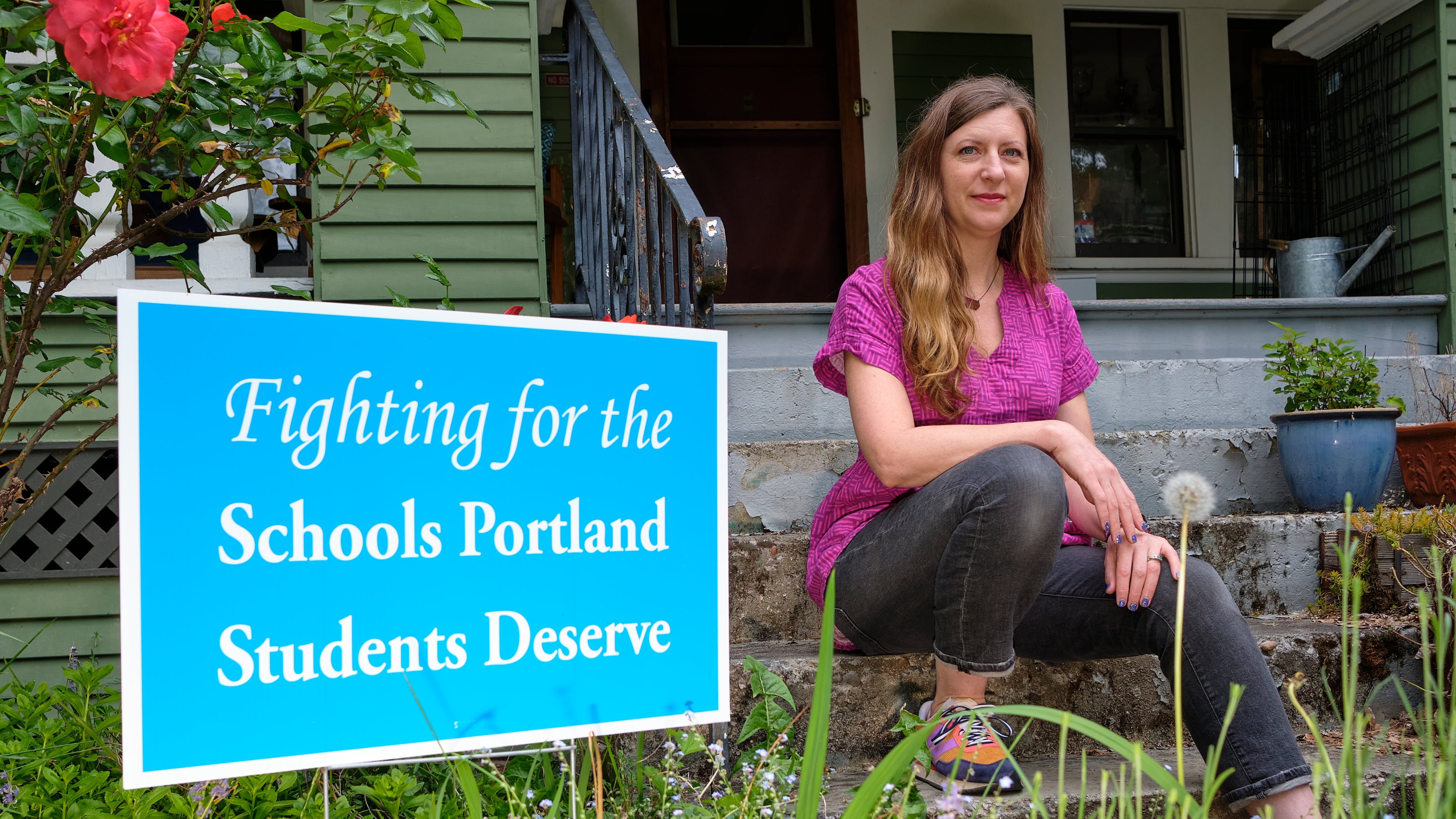On a chilly spring evening, Alameda Elementary parents zipped into polyester jumpsuits and teetered atop platform shoes to a fundraiser. The theme? Disco. The cause? Hiring someone to help teach their children.
After paying $85 a ticket—plus shelling out for a babysitter and any aforementioned polyester expenses—partyers could raise their paddles in a live auction for items such as a Grand Canyon Glamping Adventure (final net sale price: $3,500), round-trip private jet service to anywhere in the Pacific Northwest ($2,300), or a chance to get lucky in the raffle (tickets: $100 each) and end up with four nights at an all-inclusive resort in Cancun.
The March 11 event was held at an industrial-chic event space in inner Southeast called The Loft at 8th Avenue and cost the school foundation $55,000 to put on. It raised about $100,000 after expenses. Two-thirds of that haul Alameda gets to keep, and one-third goes to a general fund for the half of Portland public schools that don’t have foundations.
“It’s a great social event that everyone looks forward to,” says Surina Hollingsworth, chair of the Alameda School Foundation.
Well, not everyone. Cara Haskey has been an Alameda mom for eight years but has stopped attending the auction because the event never sat right with her.
“The idea that we needed to privately fundraise for public employees? I found it astonishing that it was even permitted,” says Haskey, who grew up attending public schools in rural Washington.
She went when her oldest daughter was in kindergarten and first grade because of “a palpable sense of urgency” that parents open their wallets to keep the school afloat. But a student getting to be “principal for a day” because their parents paid handsomely for the privilege at an auction? Parents feeling uncomfortable because they can’t afford to raise their paddles or attend the auction at all? Haskey was out.
And she is not alone.
The future of school auctions has become a fight so vicious that no elected official wants to touch it. It combines all the most combustible elements of Portland Public Schools: class, race and a shrinking enrollment that leaves parents scrambling for dollars like a dropped coke vial on the bathroom floor at Studio 54.
At issue: whether parents with discretionary income should be allowed to use it at lavish fundraisers to boost staffing at their kids’ public school.
At the district level, this battle over a 29-year-old tradition is playing out via dueling groups both advocating to the Portland School Board. In this corner: “Save PPS Foundations,” backed by a coalition of parents from 17 of the schools with the most active fundraising. Their foes: “Reform PPS Funding,” also backed by parents, who say they will no longer be complicit in a system they describe as unfair at best and racist at worst.
Despite several work sessions this school year to create a new foundation policy, there is still no draft and the School Board has all but kicked the can to next school year.
At the school level, parents who run foundations say they are just trying to provide students with the basics. Dissenters argue that glitzy auctions create further disparities for kids already ill-served by the school system.
This does not make one popular, whether it’s in the form of side-eye at the PTA or “lost” invitations to social events.
“There are times I’ve felt I’m a little bit on an island,” Haskey says. “I’ve also reached the point where I’m OK on an island.”

The Reform PPS Funding movement is run by Beth Cavanaugh, a Southeast Portland parent who published her University of Portland doctoral dissertation in 2022 about equity issues with Portland Public Schools foundations. Cavanaugh began her PPS mom life in the Abernethy Elementary mainstream: helping out with classroom art projects and attending the school auction.
“I love a party,” she says. “I didn’t stop and look around to see who wasn’t there.”
Through her work on a school boundary change committee, Cavanaugh started to connect with parents across the district and dig into fundraising data. “The time was ripe,” she says, for a discussion of social and racial inequity. The Reform PPS Funding website went live shortly after the Black Lives Matter summer of 2020.
Voicing her dissent to the established power structure at Abernethy came with steep social costs. She paused, took a deep breath, and warned “it makes me a little sad to talk about this,” before answering a question about the personal impact of her advocacy work. She lost friendships.
“I didn’t feel like I was always welcome in our school community anymore,” Cavanaugh says. “I’d show up to a PTA meeting and it was like, ‘Roll your eyes, here comes Beth again.’”
There were certainly other like-minded parents on the issue: Cavanaugh received anonymous text messages thanking her for speaking up at those same PTA meetings. But for most people, it wasn’t worth sacrificing peace on the sidelines at Saturday soccer games.
Critics of auctions have a simple beef: The schools that raise the most money tend to be in the richest, whitest neighborhoods.
For example, the top-earning foundation in the district last year was Duniway Elementary School’s, which raised more than a quarter-million dollars (see “Big Spenders,” page 17). Duniway stands serenely in the leafy Eastmoreland neighborhood of Southeast Portland. The school’s student body is about 82% white this year, compared to 55% in the district overall, according to PPS. (Disclosure: My children go to Duniway, and I have paid to attend the school’s auction three times, including this April.)
Duniway’s auction this year was also disco-themed, in part to allow an easy swapping of volunteers and decorations with Alameda.
While boozy auctions remain a rite of spring at those two schools, the tradition is fading at others.
Beverly Cleary K-8 School in Grant Park hosts an online-only school auction these days. The school’s foundation raised $39,000 last school year, including proceeds from the virtual auction. In 2018, Beverly Cleary’s auction alone raked in $178,000.
Alameda, while still hosting a robust auction, has made some shifts in the name of equity. The silent auction is online so anyone can participate, “principal for a day” is a thing of the past, and families and staff can “pay what you wish” for admission.
Vernon K-8 School in Northeast Portland stopped calling it a school “auction” six years ago because “that name evokes uncomfortable feelings for a lot of our community members,” says Vernon PTA president Maya Pueo von Geldern.
Von Geldern has two children at the school. She remembers feeling astonished when a family paid $1,600 for a classroom’s quilt project at the auction she attended when her oldest was in kindergarten.
“But when I learned about things happening at other schools, where they’re fundraising to make sure all their kids have coats for the winter or food for over vacations, those moments of excitement started to feel icky,” von Geldern says.
Vernon hosted its last “Night Out for the Owls” (the school mascot) three years ago. Despite the name change and tickets priced on a sliding scale, the event still felt divisive.
“It is still a room full of people spending money,” von Geldern says. “It is never going to be comfortable if you’re trying to pay rent and get food on the table.”
While Vernon no longer has an active foundation, the PTA is planning a community carnival June 2 with live music, food trucks, bouncy slides and games. There will be items available for “silent bidding.”

To understand how Portland Public Schools fundraising got to this point, let’s rewind to Nov. 6, 1990. Voters passed property tax limit Measure 5, which put funding for public schools in the hands of the state. PPS students soon noticed that they had to use glue sticks down to the nub and tattered textbooks would have to live to see yet another school year.
To stop the hemorrhaging, the Portland School Board passed a policy in 1994 allowing schools to establish foundations. Those foundations raised $2.76 million in the 2021-22 school year—less than one-tenth of 1% of the district’s budget.
Foundations are separate from parent teacher associations, which can fundraise for classroom needs, such as art supplies or books, but not for teachers or staff.
“There is a perception that our schools are flush with programming, and that’s just not true,” says Donna Ingram, foundation chair at Rieke Elementary in Southwest. “We have no music, no band, nothing. We fundraise just for part-time art. We have no EAs [educational assistants].”
Ingram goes to Rieke frequently to assist her own neurodiverse child because “there is nobody else to help.”
Portland Public Schools’ system of foundations that can hire teachers for individual schools is rare in public education, Cavanaugh says. In the rest of the region, the Lake Oswego, West Linn-Wilsonville and Tigard-Tualatin school districts all have one central foundation. Nationally, the conversation is more about equity among school PTAs: A school district outside of Chicago is in the midst of a familiar-sounding “PTA Equity Project” to spread the wealth more evenly.
Many of the Portland schools that do not have foundations receive Title I funds from the federal government, which is extra money for schools with a high percentage of low-income children. Separate from that, the district’s budget also provides extra money for high-needs kids and students of color, allowing them to hire more teachers and have smaller class sizes.
But the biggest factor in school funding? Enrollment. And Portland elementary enrollment has dropped by 17.3% since the 2018-19 school year, according to district data (“Big Kid on Campus,” WW, April 12).
Some schools have been hit particularly hard, including Alameda, whose enrollment has fallen 26%, a loss of nearly 200 students, over the past five years.
Hollingsworth, Alameda’s foundation chair, has noticed a massive exodus to private schools. “It’s upsetting, but I also understand why families are wanting to go,” she says. “They are fed up with the district and fed up with huge class sizes.”
When students walk away from their neighborhood school, they take their attached funding with them. Fewer students mean fewer teachers and, paradoxically, larger class sizes.
All three classes of Alameda’s second grade have 30 or 31 students in them, Hollingsworth says. Districtwide, the median class size in second grade is 21, according to Portland Public Schools data.
Schools are still dealing with well-documented pandemic effects, such as learning loss and behavioral challenges.
“What’s not being discussed is the mental health crisis that is happening,” Hollingsworth says. “Whether it’s in the form of smaller class sizes or more educational assistants, we just need more help with students.”
One of the reform camp’s ideas is to do away with foundations and instead have one central fund to which parents can donate. Gary Hollands, vice chair of the Portland School Board, has floated the idea of one huge auctionlike social event at Moda Center.
Ingram, whose background is in professional fundraising, is skeptical about moving to a central fund too quickly.
“That’s a massive risk,” Ingram says. “You don’t have the relationships. Parents love the fact that they know where their money is going. Just like people vote in their best interest, they also give in their best interest.”
Board member Julia Brim-Edwards hopes that an $8 million line item in Superintendent Guadalupe Guerrero’s budget will help keep the peace, at least for one year, if adopted next month. The money—about $120,000 per school—comes from leftover pandemic funds and with a lot of asterisks about how schools with foundations can use it.
“The most equitable thing to do is go down to Salem and advocate for more school funding or support the local option,” Brim-Edwards says, referring to a special levy that would raise extra property taxes for schools. “Because that is a way to help all school communities.”
Parents on both sides of the debate agree that after years of “talking to each other through the media,” as Ingram at Rieke describes it, they are finally communicating. The ice was broken after an April 12 meeting at district headquarters in which a group of about a dozen parents and School Board members talked informally for 90 minutes as custodians swept up around them and turned off the lights.
Since then, the groups have been working together to write a proposal that will revise the school district’s foundation policy. Hollingsworth uses words like “collaborative” and “civil” and “hopeful.”
“At the end of the day we all want the same thing,” Hollingsworth says. “All we want is better funding for our kids.”
Big Spenders
In the 2021-22 school year, Portland school foundations raised $2.76 million. Here are the 15 top-earning foundations that year, according to the Fund for Portland Public Schools. After the first $10,000, a school can keep two-thirds of money raised. The remaining third goes to the Fund for PPS and is distributed to schools without foundations: $10,000 to elementary, $15,000 to middle and $20,000 to high schools.
Duniway ES
$272,765
Bridlemile ES
$213,738
Richmond PK-5
$196,726
Lincoln HS
$194,569
Laurelhurst K-8
$193,701
Ainsworth ES
$157,728
Rieke ES
$125,787
Forest Park ES
$124,702
Alameda ES
$121,711
Sellwood MS
$101,400
Abernethy ES
$102,158
Cleveland HS
$97,344
Buckman ES
$77,177
Llewellyn ES
$75,692
Sunnyside K-8
$65,000
Source: Fund for Portland Public Schools
